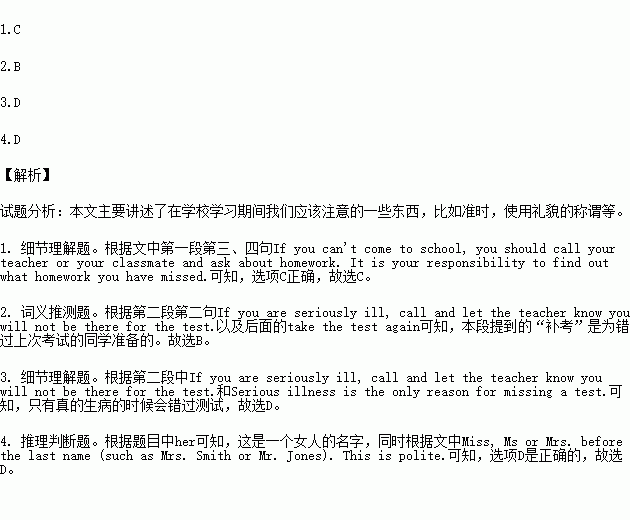题目内容
阅读下列短文,从每题所给的四个选项(A、B、C和D)中,选出最佳选项,并在答题卡上将该项涂黑。
If you are studying at school, do be a polite and clever student! There is no excuse for not doing your assignments (作业). If you can’t come to school, you should call your teacher or your classmate and ask about homework. It is your responsibility to find out what homework you have missed. It is not the teacher’s job to remind you of the missed assignments.
You must not be absent on a test day. If you are seriously ill, call and let the teacher know you will not be there for the test. If your teacher allows a make-up test, you should take the test again within one or two days after you return to class. Serious illness is the only reason for missing a test.
Be on time! It is impolite to be late. Also, it bothers other students. If you must come in late, be sure to do it quietly. Have your books and papers out of your bag before you come into the room. Then go to your seat and sit down quietly. In the USA, it is not necessary to knock before you enter the classroom. Most teachers will give you a low grade if you are often late.
In America, you should call your teacher by his or her last name instead of “teacher”. Also you should use Mr. Miss, Ms or Mrs. before the last name (such as Mrs. Smith or Mr. Jones). This is polite. The teacher will tell you the title that he or she likes. It is impolite in the USA to eat, drink or chew gum during class. Don’t do these until the break. Also, removing your shoes in the classroom is not polite.
1.What should you do if you miss a class?
A. Give an excuse for missing the assignments.
B. Tell the teacher you can’t come to school or do the assignments.
C. Call your teacher or your classmate to find out what assignments were given.
D. Ask your teacher to remind you of the missed assignments.
2.What does “a make-up test” in Paragraph 2 refer to?
A. A test for all students.
B. A test for the students missing the last test.
C. A test for the students with low scores.
D. A test for whoever missed the last test.
3.When can a student miss a test according to the passage?
A. When he/she is late for the test.
B. When he/she doesn’t want to have the test.
C. When he/she failed another test.
D. When he/she is really sick.
4.In America, if your teacher’s name is Susan Black, what should you call her politely?
A. Teacher Black. B. Ms Susan.
C. Susan Black. D. Ms Black.

